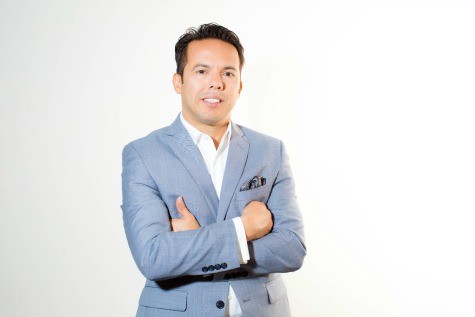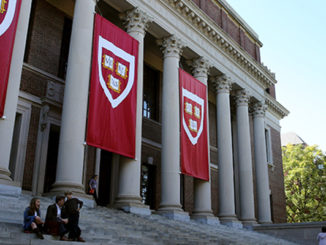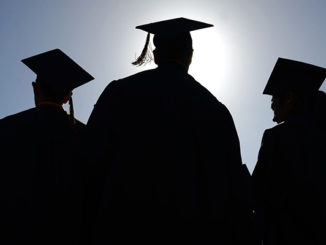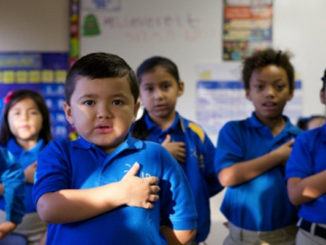
by Ruben Navarrette
Editor’s Note: Below is the third in a series of interviews that Bush Institute education fellow and syndicated columnist Ruben Navarrette is doing with Hispanic leaders on education reform issues. The series is part of the Bush Institute’s focus on school accountability, which is aimed at improving student achievement, empowering parents, and helping educators.
Religious leaders are sometimes closer to God than they are to the community in which they live and the people they serve.
Rev. Samuel Rodriguez doesn’t have that problem. As the leader of the National Hispanic Christian Leadership Conference, which he founded in 2000 and which now represents 40,118 Evangelical Hispanic churches in America and about 500,000 in Latin America and Spain, Rodriguez has a national following. In fact, he has been identified by CNN, Fox News, Time Magazine, the Wall Street Journal and others as one of the most important and influential Hispanic evangelical leaders in the United States.
But, as the son of Puerto Rican parents, Rodriguez is also an integral part of two communities that are close to his heart — the Hispanic community and the American community. And he has put in the work to become knowledgeable on issues that impact both and about which he feels passionate.
One of those issues is education, the one thing that carried Rodriguez far and which he is convinced can do the same for millions of other Hispanic students across the country. He comes to the issue not just as the father of three children who at 19, 21, and 24 are now young adults but also as a community leader who has direct first-hand experience with the subject-matter.
Rodriguez is asking 40,000 of his fellow pastors to each adopt a school in their community and find out how things are going. You can find out more about that initiative at this link.
As an interviewer, you expect a religious leader to be fluent in theology, history, maybe even politics. But when you find one who understands, and has thought through the intricacies and nuances of the public school system, it’s a rare and wonderful thing. At times, this pastor sounds like a teacher.
That’s no accident, since Rodriguez first found an audience not in a church but in a classroom. He is a former high school teacher who taught government and civics, along with honors courses, in the same Pennsylvania city in which he grew up and where he went to school, a place called — no kidding — Bethlehem.
Listening to Rodriguez talk is like trying to take a drink of water from a fire hydrant. His mind is racing, and yet he has excellent communication skills. There are all these gold nuggets spilling out, and you’re just trying to gather them up as fast as you can before the next batch comes.
And so I was anxious to hear his thoughts on the education system in America, testing, accountability and how it all fits together for the empowerment of future generations and the betterment of this great country.
Rev. Rodriguez, it’s a pleasure to speak with you. What’s your earliest memory of public school and your early life as a student?
I was lucky to have an affinity for learning, especially for classes I enjoyed like history and math. I was a math nerd. I loved math. Academically, by the grace of God, I thrived. But there were also challenges.
My parents were born in Puerto Rico. I was born in the United States, but my parents spoke Spanish at home. I had to learn English. I was in a bilingual program, what was in the mid-1970s, a kind of de-facto immersion. But my passion in math, and in history, put on an accelerated fast-track to learn English.
One of the things that President George W. Bush used to talk about was how too many of our public schools are plagued by what he called the “soft bigotry of low expectations.” Did you experience any of that?
Yes, in fact. When I was in the ninth grade, my guidance counselor took me aside and tried to convince me to go onto a vocational track. I said no, and explained that I intended to go to college. I attribute a lot of that to myopia, racism, and discrimination.
Where did you go to college?
I went to Penn State for two years. I was majoring in computer engineering but I also had a calling to undertake a different line of study more in line with the work I felt I had to do for the ministry and to serve our community. So eventually, I transferred to Lehigh University, where I completed my education.
So you knew early on that you wanted to be a minister. How did education fit into that picture?
My passion has always been education. There was a vertical calling to stay with education, maybe start my own charter school, I actually considered that. I wanted to know: How do you help empower other Latino students? But there was also a horizontal calling to act more broadly and serve people on earth.
How would you say Latino students are doing in the American educational system in 2015?
Latino students are doing better than we were in the 70’s, 80’s, 90’s. But we still haven’t reached the proverbial tipping point where students — especially those in major cities — are learning on par with other students.
Our graduation rates are lagging. Some of our students are reading “Dora the Explorer” when kids down the street are reading Chaucer and Milton. I go around the country and talk about how the system is failing our students. I don’t want to go so far as to blow up the whole system, but changes need to be made.
What sorts of changes do you have in mind? And where do teachers fit in? What sort of job would you say they’re doing?
I believe teaching is a calling from God. But I believe the system is not working well. I’m not into a big federalized system. I’m more into a local system reflective of that community’s values, and making improvements so we can compete with countries around the world. I would be make this a top priority.
If I were president, and if I were asked what was my the domestic issue, this would be it — to improve the education system by raising standards. We need to revolutionize our educational system by making it all relevant to students’ lives — math, science, history, all of it.
In that new system, how would you foster accountability?
I don’t just want kids to survive; I want them to thrive. We have to reshape the narrative — raising standards so we go from survive to thrive. We look at our community, and, we tell them: ‘If you want to die in the proverbial desert, then don’t embrace assessment.’ I know it’s difficult, but it will benefit them and us in the long run.
What can we do to include Latino parents, and help them be more active participants in their child’s education?
I would create an apparatus that resembled the PTA of the 1970’s. Make parents shareholders, not just they come in and then they leave. Form an advisory team, give them responsibilities. Create some safe zones for Spanish-speaking parents so they feel welcomed.
And what about accountability? Let’s go back to that. What about those folks in our public schools — teachers and principals — who just don’t want to be accountable for the products they’re turning out?
If you are called, you should invite accountability. Anointing without accountability is a recipe for disaster. I’m talking about measured accountability, not obstructive but effective. I’m talking about enriching accountability. We should invite that. It takes a village, to borrow a line from Hillary Clinton. Maybe not to raise a child. But it takes a village to educate one.



